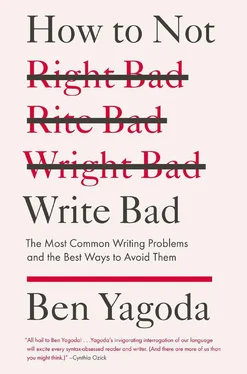[ The people signing the document were George Parkinson, Leila Fischer, and myself. ]
[ The other players and myself left the field soon afterward. ]
In the second example, myself should be replaced with I. That’s true in the first example as well, but it’s not as obvious. You can avoid the uncertainty — and improve the sentence — by recasting it:
George Parkinson, Leila Fischer, and I signed the document.
The bottom line is to use myself only when you (the speaker or writer) are the object of the verb ( I looked at myself in the mirror and have to admit I was smokin’ ) or as a way to emphasize that you were the sole actor ( I put up the bookcases myself ). Otherwise, dispense with it.
d. Share
Share is fine to signify “generously distribute,” as in He shared his cookies with the other students. But it is not fine as a psychobabbly replacement for say or discuss , as in He shared that he plans to retire next year or He shared some experiences from his tour of duty in Iraq. What to replace it with? Well, um, said and talked about .
e. Qualifiers and Intensifiers
I’d estimate that three-quarters of the time, you can improve a sentence by striking out the qualifiers ( pretty, somewhat, a little, kind of, and the currently popular kinda, sort of, rather, arguably, slightly ) and intensifiers ( very, extremely, really, completely, totally, absolutely, unbelievably, remarkably , and, of course, literally ).
Qualifiers make you come off as mealymouthed.
[ Roy Halladay is arguably the best pitcher in the National League. ]
What a weak statement! It’s tantamount to saying, “I can’t really back this up, but it’s possible that Roy Halladay is the best pitcher in the league, maybe.” Instead, pick a strong limb and take a stroll out on it:
Roy Halladay has the most wins, the most strikeouts, and the lowest ERA in the National League.
Roy Halladay was National League managers’ unanimous selection as pitcher of the year.
Or strongest of all:
Roy Halladay is the best pitcher in the National League.
Intensifiers, meanwhile, make you seem like the Boy Who Cried Wolf: This time they’re really, really coming. I mean it! Really! More often than not, a naked statement is stronger than one pumped up with intensifying steroids.
Transformers V is a very incredibly extremely unbelievably truly bad movie.
I don’t mean to suggest that adverbs — of which qualifiers and intensifiers are examples — can’t be used effectively and strategically. I just did so. The key is that effectively and strategically , in this context, are specific and precise, as opposed to adverbs meant to vaguely stoke the fire of your argument or cover your posterior.
f. Others to Avoid
Particular is a currently popular four-syllable word that usually adds nothing to a thought except four syllables.
That particular film is the most exciting science-fiction epic of the summer.
Personally rarely if ever contributes anything of value, either.
Personally, I believe U.S. tax policy is a disaster.
( I believe goes as well: you wrote it, so of course you believe it.)
Personal tends to be redundant, most notoriously in the expression personal friend (what other kinds of friends are there?), but also in:
She led me to her personal office, which overlooks the museum’s gardens.
Prefacing a statement with frankly, to tell the truth, I’m not going to lie , or some other such pledge of verity has the effect of making you seem like you’re not 100 percent sincere. So avoid them.
Actually, a hugely popular word at the moment, is actually usually just filler.
We a c tually met in summer camp.
Aforementioned is an oddly legalistic word that has cropped up in some of my students’ writing over the last few years. Why, I don’t know, but I do know that it should go.
With the publication of his aforementioned novel, The Corrections, Jonathan Franzen gained a great deal of notoriety.
Even in quoted dialogue, stay away from dialect, or, in general, words that are spelled to indicate someone’s accent or pronunciation: kinda, gonna , the Southerner who laaahks something, the New Yawker who tawks like dis . A very little of this goes a very long way. Plus, sometimes it just doesn’t make sense. Sometimes a person will be described as saying, “I wazzunt there,” making me wonder, What, exactly, is the difference in pronunciation between wazzunt and wasn’t ?
2. LENGTHY IS DESIRABLESHORT IS GOOD (I)
The English language is unusual and I believe unique in having thousands of pairs of synonyms in which one of the words is plain and the other fancy. Usually, the longer word is Latinate in origin and the shorter one Anglo-Saxon. No matter what kind of writing you’re doing, it’s usually the case that the simpler word is better. The chart below lists some common pairs.

You get the idea, right? Now, sometimes you will want the fancy word, for variety, ironic effect, sound, or some other reason. And hundreds and hundreds of splendid multisyllabic and/or fancy words, especially the much-maligned adjective, have no simple equivalent. What better way to describe an out-of-the-way word than arcane, a bitter person than dyspeptic, or the act of deliberately giving up something as eschewing ? If you “own” such a word, in the sense of being confident of its meaning and nuance, go for it! (Needless to say, the best way to gain ownership of a lot of great words is to read a lot.) Otherwise, nine times out of ten, simpler is better.
E. B. White has a wonderful paragraph about his former Cornell teacher William Strunk, author of the original Elements of Style , which White edited and updated in the 1950s and which has been in print ever since. The subject is concise sentences (addressed in III.C.4.), rather than short words, but it is worth a listen no matter what:
“Omit needless words!” cries the author on page 39, and into that imperative Will Strunk really put his heart and soul. In the days when I was sitting in his class, he omitted so many needless words, and omitted them so forcibly and with so much eagerness and obvious relish, that he often seemed in the position of having shortchanged himself — a man left with nothing more to say yet with time to fill, a radio prophet who had outdistanced the clock. Will Strunk got out of this predicament by a simple trick: he uttered every sentence three times. When he delivered his oration on brevity to the class, he leaned forward over his desk, grasped his coat lapels in his hands and, in a husky, conspiratorial voice, said “Rule Seventeen. Omit needless words! Omit needless words! Omit needless words!”
As I say, the passage is about short sentences, but it uses short words. To be specific, here’s the percentage of time White (generally considered to be one of the finest American stylists of the twentieth century) uses words of various lengths:
One-syllable: 67 percent
Two-syllable: 21 percent
Three-syllable: 10 percent
Читать дальше













